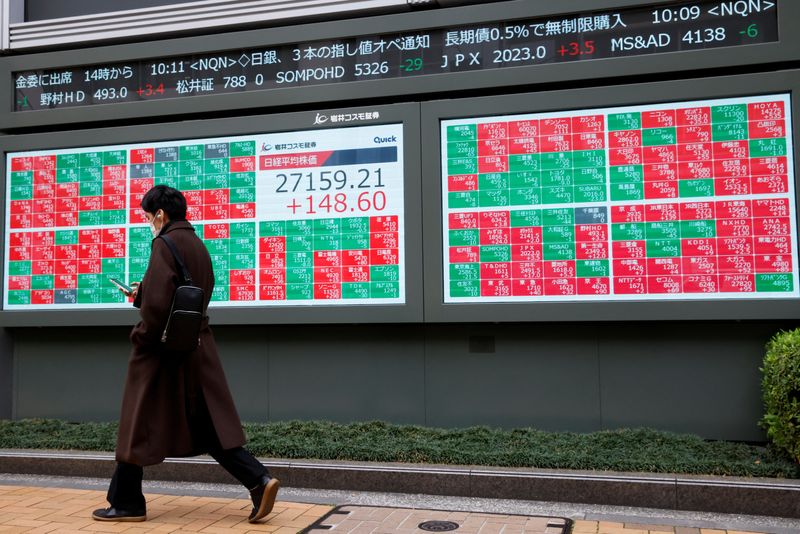Default in U. S. puts pressure on stock market
2023.05.25 22:41

Default in U. S. puts pressure on stock market
By Tiffany Smith
Budrigannews.com – Despite notable gains in Japan, stocks were subdued on Friday as high-stakes talks to avoid a U.S. debt default drew to a close and an artificial intelligence rally took a break.
MSCI’s broadest file of Asia-Pacific offers outside Japan floated 0.3% higher in exchange diminished by a vacation Hong Kong. The list is down 1.6% on the week.
, on the other hand, increased by 0.7% and is benefiting from foreign inflows and the subsequent surge in revenue and production for U.S. chipmaker Nvidia (NASDAQ:). that have caused exposure-laden Japanese businesses to soar.
The Nikkei is up 0.7% on the week, as well, for a seventh week after week gain in line – its longest week by week series of wins in five years and one which has added a $460 billion to Japanese stocks.
May information on Friday showed expansion easing back to 3.3% in Tokyo, a good intermediary for the country, and that implies it’s been serenely over the Bank of Japan’s 2% objective for a year at this point. For decades, the third-largest economy in the world has struggled to achieve meaningful and sustained price, profit, and wage increases.
According to Nomura analysts, “the pandemic has brought with it an unprecedented string of inflation drivers for Japan,” households are spending, and stock forecast ranges have been upgraded.
“These forces have caused a tectonic shift in the way Japanese companies set prices, which has improved their profit margins.”
Even though the yen crept to a stronger side of 140 per dollar on Friday, it is down 1.4% this week as concern about a possible U.S. debt default causes the dollar to rise. A weak yen has also been helping to flatter the accounts of Japanese exporters.
The dollar is up around 0.7% on the euro for the week and keep going exchanged at $1.0730 on the normal money. Overnight, it reached a three-month high of 104.31 before closing at 104.16, up 0.9 percent on the week.
U.S. President Joe Biden and top legislative Conservative Kevin McCarthy are finalizing in on a negotiation to raise the US government’s $31.4 trillion obligation roof for a considerable length of time, a U.S. official told Reuters, yet there’s no time to spare.
The U.S. Treasury predicts that it will run out of money within a week, and enforcing any agreement will make matters worse.
While the rest of the curve was under pressure as investors have also been concerned that U.S. rates will rise, prices for Treasury bills that are due to mature on the so-called X-date of June 1 recovered overnight in anticipation of a breakthrough.
On Friday, two-year yields in Asia reached a two-and-a-half-month high of 4.552 percent, up 24 basis points from the previous week.
The New Zealand dollar has lost a lot this week, falling 3% to 60 cents. As a result of concerns about higher U.S. interest rates, New Zealand’s central bank almost stopped raising rates on Wednesday.
The was last at $0.6077.
has been the other notable casualty, and it has fallen along with Chinese stocks as expectations of a strong recovery from the pandemic have diminished.
The yuan has fallen for the third week in a row and has lost 0.8% this week, reaching lows not seen since China was still under COVID lockdowns at the end of last year. It was last at 7.0679 to the dollar.
RBC technical strategist George Davis stated, “The U.S. debt issues are not the only ‘ceiling’ that we are dealing with, as a slowdown in Chinese economic data suggests that a ceiling for growth may be forming as well.”
“This is demonstrated by a selloff in iron ore as well as by a decline in Chinese stocks and the yuan.”
On Thursday, Shanghai copper fell to a six-month low and is currently down about 2.5% for the week. The week-over-week price of Singapore iron ore is down about 3%. Futures have remained consistent around $76 per barrel. is $1,947 per ounce.








